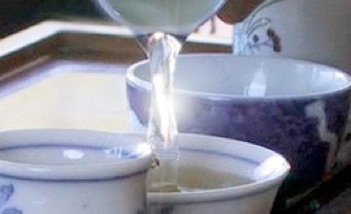A World of Tea
Introduction | Cultivating | Brewing and Drinking
Types of Tea | Cooking with Tea | Tea Recipes

In an age of supercharged lattes to go and Red Bull by the case, it’s hard to imagine lingering so leisurely and philosophically over tea. But perhaps now, more than ever, we should slow the rush and learn to enjoy the world in a cup of tea.
Mention Asian tea these days, and many think of their favorite boba flavor or the generic pot that arrives free with the dinner special. Tea plants were first grown in Asia, where drinking tea was refined to an art centuries before Europeans even discovered the fork, yet many of us know little about the tiny leaves that changed history and defined entire cultures.
Like salt, sugar, pepper, coffee and many other common foods we keep in our kitchens, tea was once reserved only for the wealthy and powerful. Over 2,000 years ago, Chinese kings first drank an intensely bitter brew as medicine. By the end of the 3rd century, the nobility was requesting milder infusions of tea at banquets, much preferring its refreshing properties to wine’s dulling effects.
Monks, who depended on it for their long days of meditation, carried tea leaves with them as they traveled throughout Asia. Tea was adopted as quickly and readily as Buddhism, and to this day, it remains an integral part of life—from the weak infusion served as daily drinking water to the strong brew that cures ailments, from a pot that starts business negotiations to the cup that marks a marriage.
January 2008
The first cup moistens my lips and throat, the second cup breaks my loneliness, the third cup searches my barren entrails but to find therein some five thousand volumes of odd ideographs. The fourth cup raises a slight perspiration—all the wrong of life passes through my pores. At the fifth cup I am purified; the sixth calls me up to the realm of immortals. The seventh cup—ah, but I could take no more! I only feel the breath of the cool wind that raises in my sleeves. Let me ride on this sweet breeze and waft away thither.
— Lu Tung, 8th century poet
© Thy Tran
